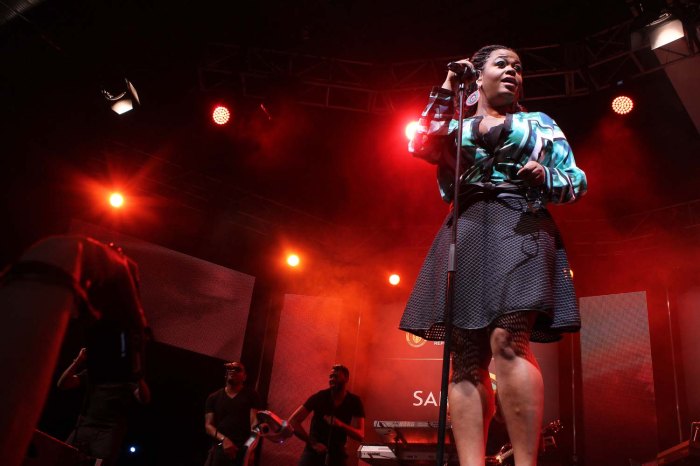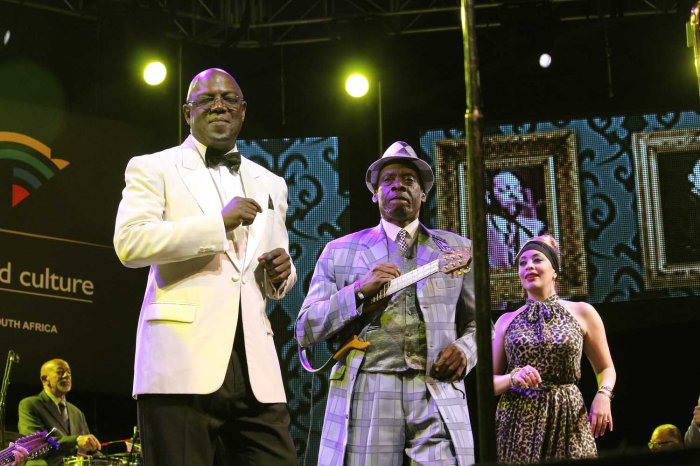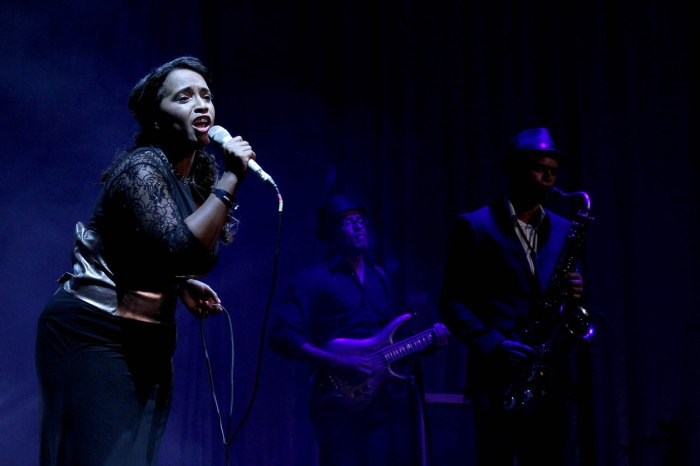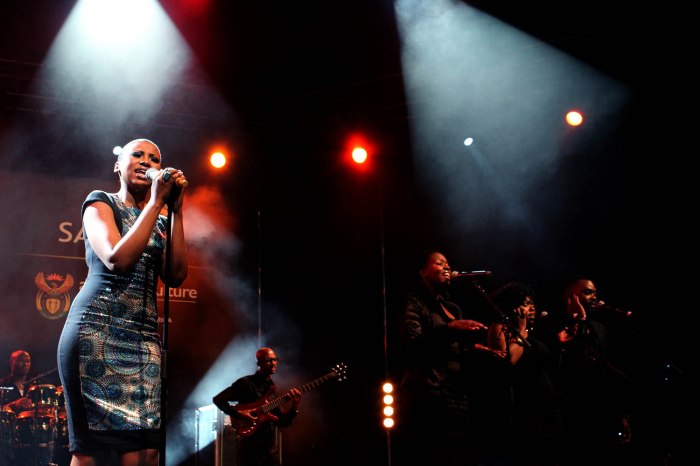
The city of Cape Town played host to local and international musicians at the 2013 Cape Town International Jazz festival (CTIJF). The festival which is in its 14th year featured 39 artists most of whom were local musicians such as Mafikizolo, Zonke, Jimmy Dludle, Auriol Hays, Africa Mkize, Mi Casa, Thandiswa Mazwai, Pu2ma, Ibrahim Khalil Shibab and international artists such as Orquestra Buena Vista Social Club, Kirk Whalum, Chiekh Lô, Gregory Porter and three-time Grammy Award-winning singer and songwriter Jill Scott who was the headline act.
Scott performed at the packed Kippies stage on Saturday evening also shared by South African musicians Thadiswa Mazwai and Jimmy Dludlu and the Orquestra Buena Vista Social Club featuring Omara Portuondo. She was supposed to perform last year but her show was cancelled leaving many fans disappointed.

Speaking at a post-event press conference, Scott described the audience as “exceptionally attentive. They were focussed on everything, every second of every minute. When I was quiet they were quiet when I was big they were big. I enjoyed that”.
Scott who describes her music as soul revealed that “every song comes from a portion of my existence and some from other peoples experiences, but I always try to put myself in their position so that there can be honesty”.
Deputy Mayor of Cape Town Ian Neilson said that the festival has grown to become special event for the city and people and it has become one of the most celebrated events in Cape Town. “It brings various artist and diverse individuals from all over the world. Additionally the economic benefits of the festival are far reaching; brings much needed tourism, revenue and most important job creation for locals”
It is estimated that the festival contributes to 489 million rand of the Western Cape province GDP and this figure has increased nationally by 7% from 2010 clearly demonstrating its continued importance to South Africa.
Apart from the economy, the festival “creates a platform for local musicians to collaborate with their international counterparts, and thereby showcase their talent to wider audiences” Nelson said.
Before the festival, there are a series of events that lead up to the festival such as workshops for upcoming musicians a photographic exhibition and a free concert for those who cannot afford the main event. One of the key components of the festival has been the Sustainable Training and Development Skills Transfer programme, which designed to “inspire and develop the next generation of music industry players.

This year the photographic exhibition featured works by one of South Africa’s iconic photographers the late Alf Khumalo. The two-day exhibition held at the DuoTone Gallery which was at the same festival precinct, was “a fitting honour to Khumalo who enjoyed an unrivalled opportunity to be at the right place at the right time and to capture the history of the countries moments of history. He used his camera an instrument in exposing the apartheid government”.
South African musicians Mafikizolo and Khuli Chana began and ended the festival at Kippies and Baseline stage respectively. Basil “Manenberg” Coetzee, Rosies, and Moses Molelekwa were other stages where artists such as Juan-Luc Ponty, Afrika Mkhize, Mi Casa, Dubmarine among other and the other artists performed. Rosies was a more intimate stage and guests had to pay R30 extra to watch the shows there. Victor Ntoni or Bra Vic as he was commonly known was supposed to be one of the artists performing but unfortunately passed away. Acclaimed musicians such as Herbie Tsoaeli, Arthur Shabala, and Percy Mbonani paid tribute to him; celebrating him and his music at the Rosies stage.
The festival featured artists from Europe America, Brazil, Lithuania, Cuba and South Africa and Senegalese musician Cheikh Lô was the only musician from Africa (other than South Africa)
Lô describes his music as a fusion of Mbalax (pronounced Balach), folk and Senegalese music. “I put a lot of colour in my music because colour is harmony. Born in Burkina Faso to Senegalese parents, Lô formed his band in 1975 and performed with musicians from Ivory Coast, Guinea, Zaire, Congolese and Mali, and played the style of the music from those countries. Senegal is a country whereby Cuban music is popular and Lô’s music is influenced by that. “Cuban music is my first school of listening”.
Saxophonist Kirk Whalum who is part of a group called BWB featuring guitarist Norman Brown and trumpeter Rick Braun performed for the first time at the festival as a group. BWB taken from their surnames Brown-Whalum-Braun, each have a solo career but collaborated to produce “an easy-listening combination of jazz sounds with a twist of innovative improvisation”.
Speaking about how music culture has evolved over the years Whalum describes it as a boomerang. “I see it revolving back to its African roots. Music that is popular now with young people has a direct connection to Africa or African artists. It makes me feel great as an African American”. He attributes this to the fact that perhaps America has a president with African origin hence musicians are looking back to the “mother” for inspiration and information that will translates in a creative way in their art.
 Their first BWB album titled Groovin’ came out in 2002 whereby they redid great cover titles by Alicia Keys, and The Drifters in “a fresh and organic way”. They have known each other since they were young and respected and loved each other’s music and at one point they were all produced by Warner Bros Records.
Their first BWB album titled Groovin’ came out in 2002 whereby they redid great cover titles by Alicia Keys, and The Drifters in “a fresh and organic way”. They have known each other since they were young and respected and loved each other’s music and at one point they were all produced by Warner Bros Records.
“We recorded our music back then with the help of Mark Pearson who was the president of Warner Bros back then; he was the motivating force to bring the three of us together”. In 2013 they came together after requests from fans and had a concept to do a cover treatment of a great artist; Michael Jackson. They decided to do a record with the same “organic twist”, and did some of the tunes they all love such as Don’t Stop Till You Get Enough, Beat It and Can’t Help It. “Its music that everybody knows but we recorded in a way that nobody has heard before”. It will be released in June 18 which will be a week before Jackson’s memorial of his death.
To keep the “organic” feel to the album, the group recorded in the studio with a live band and cut it live. It definitely translated to how they performed at the festival because they travel with the same musicians they recorded the album with. They include keyboardist John Stoddardt, bass guitarist Braylon Lacy, and drummer Hamilton Hardin. “Our mission is to inspire the human spirit individually and collectively. We have grown feeding up from the human spirit we feed off that love and give it back”.
The CTIJF was incepted in 2000 and since then it has grown to be one of the most successful events in Africa. This year over 34,000 thousand people attended the sold out event.
